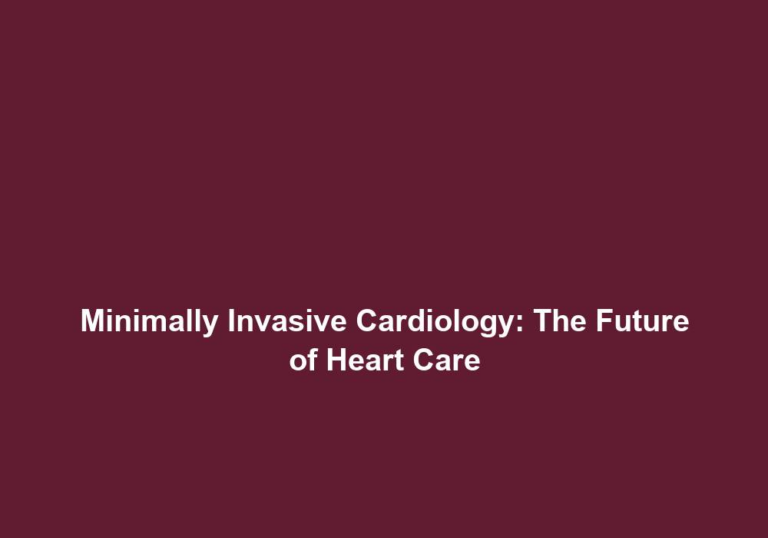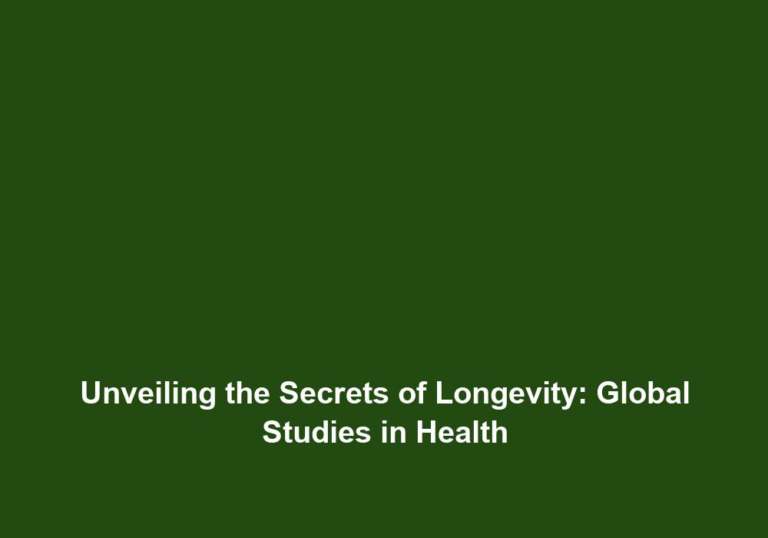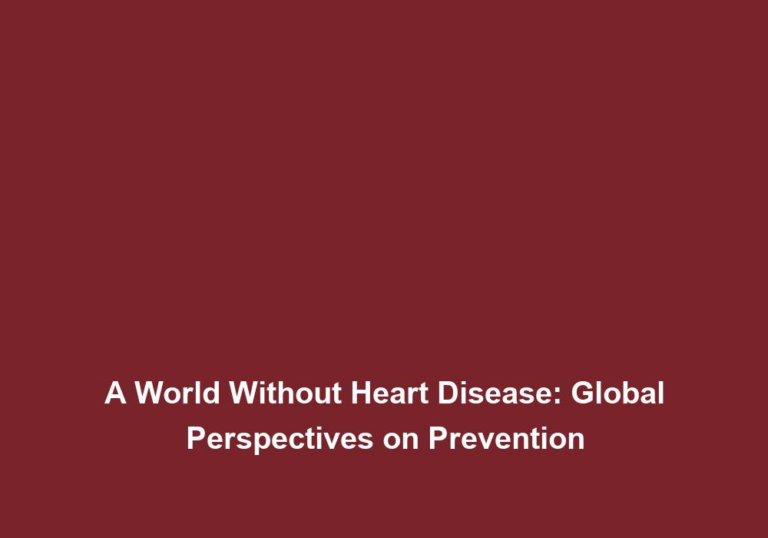Scientific Wisdom from the World: Global Insights into Heart Health
Heart disease is one of the leading causes of death worldwide, affecting millions of individuals each year. To combat this growing global burden, it is crucial to gather insights from various scientific sources across the world. By understanding the factors contributing to heart health and developing strategies for prevention and treatment, we can make significant progress in combating heart disease. In this article, we will explore global findings and scientific wisdom that shed light on heart health.
The Global Burden of Heart Disease
Heart disease is a global health challenge that affects individuals across all continents. According to the World Health Organization (WHO), cardiovascular diseases are responsible for approximately 17.9 million deaths each year. This staggering number emphasizes the need for a comprehensive understanding of heart health.
Understanding the global burden of heart disease is essential for developing effective prevention and treatment strategies. By analyzing data from diverse populations, scientists can identify common risk factors and tailor interventions accordingly. This approach allows for targeted efforts to address the specific needs of different regions and communities.
Variations in Heart Health across Different Countries
Heart disease prevalence varies across different countries, which can be attributed to various factors such as lifestyle choices, genetic predisposition, and healthcare systems. By analyzing data from diverse populations, scientists have identified key insights into heart health and developed strategies to mitigate the risk factors.
Lifestyle Factors and Heart Health
-
Diet: Research indicates that a diet rich in fruits, vegetables, whole grains, lean proteins, and healthy fats can significantly reduce the risk of heart disease. Traditional Mediterranean and Japanese diets, for instance, are associated with lower incidence rates of cardiovascular problems. These diets are characterized by high consumption of plant-based foods, which provide essential nutrients, antioxidants, and fiber that support heart health. Additionally, they tend to be low in saturated fats and cholesterol, which are known risk factors for heart disease.
-
Physical Activity: Regular exercise is crucial for maintaining a healthy heart. Studies have shown that engaging in moderate-intensity aerobic activities, such as brisk walking or cycling, for at least 150 minutes per week can reduce the risk of heart disease. Physical activity helps improve cardiovascular fitness, lowers blood pressure, and reduces the risk of obesity, diabetes, and other conditions that contribute to heart disease. Encouraging individuals worldwide to adopt an active lifestyle is essential for promoting heart health. This can be achieved through community-based programs, workplace initiatives, and educational campaigns that emphasize the importance of regular physical activity.
-
Tobacco Use: Smoking is a major risk factor for heart disease. Countries with effective anti-smoking campaigns and strict tobacco control policies have witnessed a decline in heart disease prevalence. Raising awareness about the harmful effects of smoking and implementing tobacco control measures are critical for reducing the burden of heart disease. Public health campaigns, increased taxation on tobacco products, and comprehensive smoking cessation programs can help individuals quit smoking and prevent the onset of heart disease. It is also important to address other forms of tobacco use, such as smokeless tobacco and electronic cigarettes, which can also contribute to heart health problems.
Genetic and Environmental Factors
-
Genetic Predisposition: Genetic variations can influence an individual’s susceptibility to heart disease. By studying populations with a high prevalence of heart disease, researchers have identified specific genetic markers associated with an increased risk. Understanding these genetic factors can help develop personalized preventive and treatment strategies. Genetic testing and counseling can provide individuals with valuable information about their risk of developing heart disease and guide them towards making informed decisions about lifestyle modifications and medical interventions. Additionally, ongoing research in genomics and precision medicine holds promise for further advancements in personalized approaches to heart health.
-
Air Pollution: Exposure to air pollution, particularly fine particulate matter, has been linked to an increased risk of heart disease. Studies from different regions have highlighted the importance of reducing air pollution through policies, industrial regulations, and public awareness campaigns to protect heart health. Governments and organizations can implement measures such as promoting clean energy sources, improving public transportation, and enforcing emission standards to reduce air pollution levels. Individuals can also take steps to minimize their exposure to air pollution by staying indoors during peak pollution hours, using air purifiers, and wearing masks in heavily polluted areas.
Global Approaches to Heart Disease Prevention and Treatment
Collaboration and shared knowledge have led to the development of effective approaches for the prevention and treatment of heart disease on a global scale. Here are some notable initiatives and strategies:
1. Cardiovascular Disease Prevention Programs
Several countries have implemented national programs that focus on preventing heart disease through education, regular health screenings, early intervention, and lifestyle modifications. These programs aim to raise awareness about heart health, reduce risk factors, and promote healthy behaviors. They often involve partnerships between healthcare providers, community organizations, and government agencies to ensure widespread implementation and reach diverse populations. By targeting high-risk individuals and providing them with the necessary resources and support, these programs can significantly reduce the incidence and impact of heart disease.
2. Advancements in Medical Technology
Medical technology has played a crucial role in diagnosing and treating heart disease. Innovations such as wearable devices, remote monitoring systems, and telemedicine have improved access to cardiovascular care, especially in remote and underserved areas. These advancements enable early detection of heart conditions and facilitate timely interventions. Telemedicine, for example, allows patients to consult with healthcare professionals remotely, reducing the need for travel and increasing access to specialized care. Wearable devices can track heart rate, blood pressure, and other vital signs, providing individuals with real-time feedback and empowering them to actively manage their heart health.
3. Research and Clinical Trials
Global collaborations in cardiovascular research and clinical trials have paved the way for groundbreaking discoveries and advancements in the field. By pooling resources, expertise, and data from different countries, scientists can conduct large-scale studies that provide valuable insights into heart disease prevention, treatment, and personalized medicine. Research initiatives focus on understanding the underlying mechanisms of heart disease, identifying novel therapeutic targets, and evaluating the effectiveness of interventions. Clinical trials play a crucial role in testing new drugs, procedures, and interventions to ensure their safety and efficacy. By participating in research and clinical trials, individuals can contribute to the advancement of heart health knowledge and access cutting-edge treatments.
4. Health Education and Awareness Campaigns
Public health campaigns aimed at educating individuals about heart disease risk factors, symptoms, and preventive measures have proven effective worldwide. These campaigns focus on reducing tobacco use, promoting healthy diets, encouraging physical activity, and raising awareness about the importance of regular health check-ups. They utilize various communication channels, including mass media, social media, and community-based initiatives, to reach diverse populations. Health education programs in schools, workplaces, and healthcare settings play a critical role in empowering individuals to make informed decisions about their heart health. By providing accurate and accessible information, these campaigns aim to empower individuals to take control of their heart health and adopt healthier lifestyles.
Conclusion
Scientific wisdom from around the world has provided valuable insights into heart health, contributing to the global understanding of heart disease prevention and treatment. By examining lifestyle factors, genetic predisposition, environmental factors, and global approaches to heart health, we can work towards reducing the burden of heart disease globally. It is essential for individuals, healthcare professionals, policymakers, and researchers to collaborate and implement evidence-based strategies to promote heart health and improve outcomes for individuals affected by heart disease. Together, we can make significant progress in preventing and managing heart disease, ultimately saving lives and improving the quality of life for millions of people worldwide.







